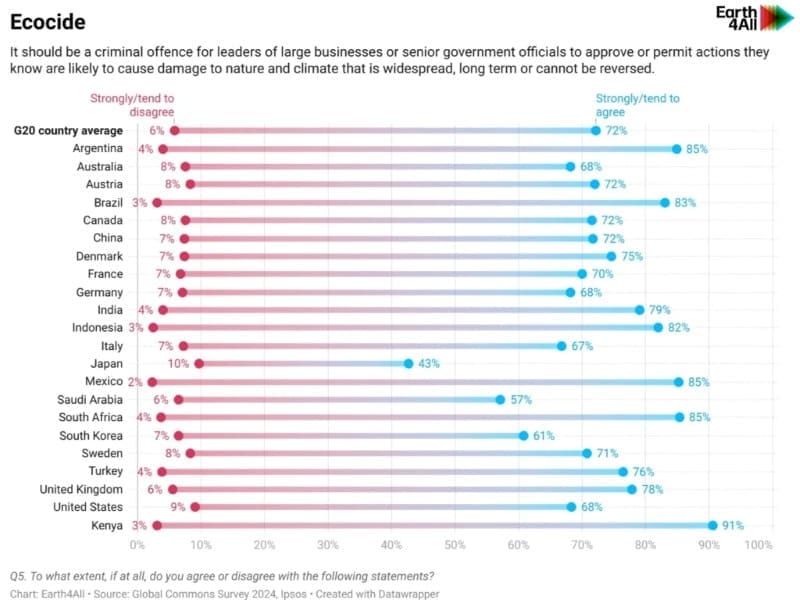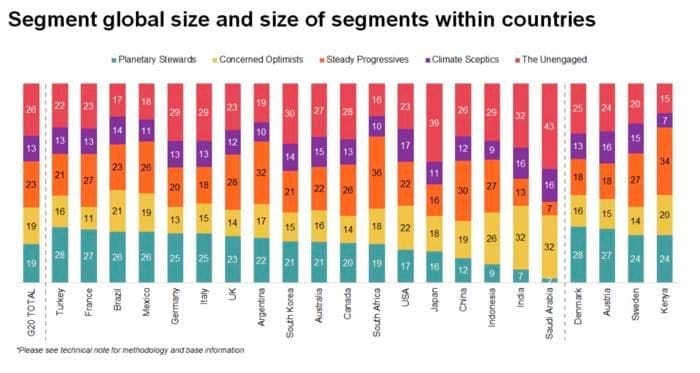G20 majority backs criminalizing eco-damage
A striking 72% of people – nearly three out of four people – across 18 G20 countries believe it should be a criminal offence for government officials or corporate leaders to permit actions that cause severe harm to nature and the climate, according to the Global Commons Survey 2024.
The survey, conducted by Ipsos UK for Earth4All and the Global Commons Alliance, highlights growing global concern about environmental degradation and the urgency for stronger legal measures to address it.

The survey, which excluded Russia, reveals that public support for such criminalization is widespread across the world’s largest economies. The findings reflect the ongoing momentum following legislative changes like Belgium‘s recognition of ecocide as a federal crime earlier this year, along with similar initiatives in Chile, France, and proposals in countries such as Brazil, Italy, the Netherlands, Peru, Scotland and Mexico.
Owen Gaffney, co-lead of Earth4All, noted the significant public support: “The majority of people want to protect the global commons; 71% believe the world needs to take action immediately.” He emphasized that the growing awareness of the urgent need to safeguard the planet is a critical turning point.
The survey’s results further revealed that 69% of respondents agree Earth is nearing critical tipping points due to human activity. Meanwhile, 59% expressed serious worry about the current state of nature. This reflects a slight increase in concern since the 2021 Global Commons Survey.
Planetary stewardship and public opinion
The survey categorizes respondents into five “Planetary Stewardship Segments” based on their attitudes toward environmental responsibility. These include Planetary Stewards, Concerned Optimists, and Steady Progressives — groups advocating for strong action to protect the environment — who collectively make up 61% of respondents across the G20 countries. This marks a shift, as more people now advocate for protecting the planet than those who are indifferent or dismissive.
Jane Madgwick, Executive Director of the Global Commons Alliance, emphasized the need for collective action: “People everywhere are very worried about the state of our planet (…) It all comes down to what we can do collectively to safeguard and restore the global commons which sustain all life on Earth and protect us from the most severe impacts of climate change.”
Gender and regional differences
The survey also uncovered notable gender disparities in environmental concern. Women tend to be more worried than men, with 62% of women expressing concern (‘extremely or very worried‘) about the state of nature today, compared to 56% of men. Additionally, 74% of women support immediate action within the next decade, compared to 68% of men.
Geographically, respondents from emerging economies like India (87%), China (79%), Indonesia (79%), Kenya (73%) and Turkey (69%) feel more exposed to climate risks. This contrasts with lower perceived exposure levels in Europe and the United States.
Support for ecocide legislation
Public support for ecocide legislation is reinforced by ongoing policy developments.
Jojo Mehta, Co-founder and CEO of Stop Ecocide International, noted: “The new Global Commons Survey makes it obvious that there is already a strong foundation of public support for this law. People clearly understand that the most severe forms of environmental destruction harm all of us, and that there is real deterrent potential in creating personal criminal liability for top decision-makers. Damage prevention is always the best policy, which is precisely what ecocide law is about.”
This growing awareness is reflected in the European Union’s recently revised Environmental Crime Directive, which now includes provisions akin to ecocide. EU member states have two years to incorporate these regulations into national law.

Tipping point for action
The survey suggests that the world may be at a social tipping point regarding planetary stewardship. In countries like Turkey, France, Brazil, and Mexico, the majority of respondents fall into the “Planetary Stewards” category, advocating for systemic change to address climate and environmental challenges.
As G20 countries represent 85% of global GDP and 78% of greenhouse gas emissions, public opinion in these nations holds significant weight in shaping global environmental policy.
Gaffney concluded: “We found that the idea of planetary stewardship is strongest in emerging economies like Brazil, Argentina, South Africa, and Kenya,” signaling the potential for these countries to lead the charge in environmental action.
Article Source:
Press Release/Material by Earth4All
Sources: Global Commons Survey 2024 | Earth4All | Global Commons Alliance
Featured image credit: atlascompany | Freepik (AI Gen)




